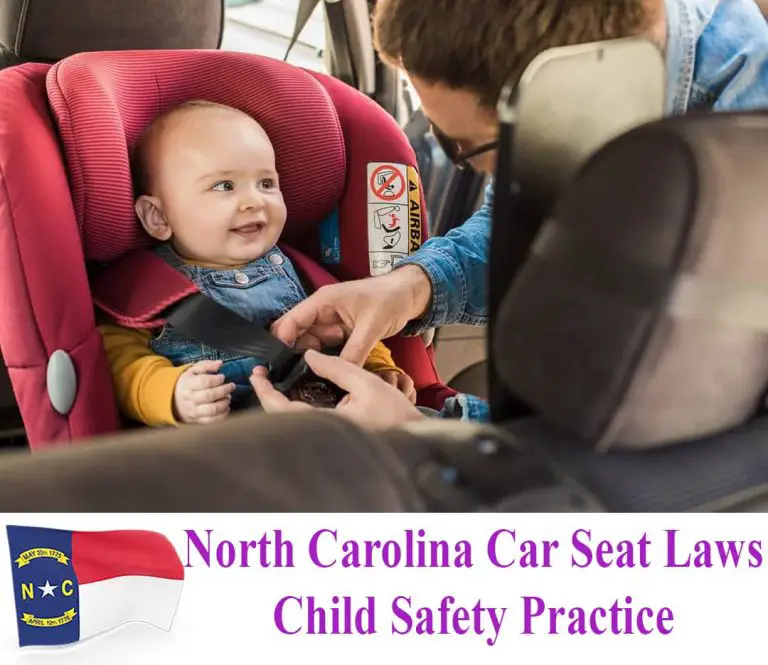North Carolina Car Seat Laws - Updated & Simplified

Table of Contents
North Carolina Car Seat Laws
North Carolina Child Car Seat Laws (NC Statutes 20-135.2A and 20-137.1C)
What do the child restraint laws in North Carolina say?
NC Statutes 20-137.1C – Child restraint systems
- All passengers under 16 years shall be properly secured in a child passenger restraint system or seat belt that meets federal standards.
- Preschoolers under 5 years and weighing under 40 lbs. shall be restrained in the back seat.
- A child under 8 years and weighing under 80 lbs. shall be restrained in an appropriate child restraint system that fits the child’s weight.
- If the seat position where a child restraint system that is to be installed for a child less than 8 years and 40-80 lbs. is not equipped with a lap and shoulder belt, the child may be restrained by a properly fitted lap belt only.
NC Statutes 20-135.2A – Seat belt use
- All passengers under 16 years shall be properly secured in a child passenger restraint system or seat belt that meets federal standards.

More on the Law
- A violation of the North Carolina car seat laws shall be punished with a penalty of not more than $25.
- A violation of the child restraint system laws (NC Statutes 20-137.1C) shall have two driver’s license points assessed.
- A violation of the seat belt laws (NC Statutes 20-135.2A); where a rear-seat passenger fails to wear a seat belt as required by the law shall pay a penalty of $10.
North Carolina Car Seat Laws for Infants Rear Facing
The North Carolina car seat laws do not exactly define the types of car seats as rear-facing, forward-facing, or booster seat for a child’s weight but mention using a “weight-appropriate child passenger restraint system.”
According to this, a rear-facing car seat is to be used for infants and toddlers under 2 years as recommended by the American Academy of Pediatrics.
You are also to follow the instruction of the car seat manufacturer regarding the weight and height limit for a car seat.
However, the car seat laws mention installing a child restraint system in the back seat.
You also have to know that the center is the safest position when installing a child restraint system in the back seat.
North Carolina Car Seat Laws Forward Facing
The State of North Carolina car seat laws does not also define a type of car seat here but mention that preschoolers under 5 years and weighing under 40 lbs. should be restrained in the back seat.
By car seat manufacturers’ recommendations, preschoolers aged 3-5 years are to ride in a forward-facing position.
Forward-facing car seats are recommended for toddlers, preschoolers, and school-aged children who have outgrown the weight and height limits for the rear-facing car seat.
North Carolina Car Seat and Booster Seat Laws
While there isn’t a mention of booster seats in the law, by car seat manufacturer’s recommendation, the appropriate child restraint system for school-aged children 8-12 years is a belt-positioning booster seat.
The booster seat is used when your child outgrows the weight and height requirements for a forward-facing car seat.
There are two standard types of booster seats: high-back and backless seats.
However, some car seat models are such you can use as rear-facing, forward-facing, and booster seats. These types are called 3-in-1 or All-in-One car seats.
North Carolina Child Seat Belt Laws
The seat belt laws in North Carolina state that:
- All passengers under 16 years shall be properly secured in a child passenger restraint system or seat belt that meets federal standards.
- If the seat position where a child restraint system that is to be installed for a child less than 8 years and weighing 40-80 lbs. is not equipped with a lap and shoulder belt, the child may be restrained by a properly fitted lap belt only.
The law requires that an adolescent less than 16 years should be restrained in a seat belt and a child less than 8 years if the seat position does not have a lap and shoulder belt installed.
On the other hand, using a belt-positioning booster seat for a child less than 12 years will be a better safe practice as recommended by car seat manufacturers.
Other Car Seat Laws You Need to Know About in North Carolina
Car Laws for Other Passengers in a Car
All other occupants of the car must be restrained by a seat belt.
North Carolina Car Seat Laws Front Seat – Can A Child Sit in The Front Seat?
North Carolina car seat laws mention ‘preschoolers under 5 years and weighing under 40 lbs. should be restrained in the back seat.’
By extension of general law, children under 13 years are to ride in the back seat.
On the other hand, North Carolina car seat laws require you don’t install a car seat in a seat position where there is an “active passenger-side front airbag.”
Only the front passenger seat usually has an airbag; therefore, you should not let a child ride in the front seat in North Carolina.
North Carolina Car Seat Laws for Ubers, Taxis, or Cabs
The North Carolina child restraint law does not mention taxis.
However, since we are still talking about your child’s safety when riding in a car, it is advisable to adopt the best practices of car seat safety laws when in a taxicab.
It may be necessary you install your infant car seat in a taxicab. You may do that without the base. This resource on installing a car seat without base will come in handy.
Can You Leave A Child in Your Car Alone in North Carolina?
North Carolina generally does not practice the ‘hot car.’
However, leaving a child unsupervised in a car is not a good practice.
The city of Greensboro highly discourage against such and has a guide here to make you understand the dangers of leaving a child in a vehicle.
There is pending legislation to prohibit leaving a child in a vehicle. Still, note that prosecutors can file charges under existing child endangerment laws.
Smoking Around Children in Cars – is it illegal?
Presently, no law restricts smoking in a private car with a minor present. However, there could be an inclusive clause when drafting a custody order that will prohibit a parent from smoking when a child is present in a vehicle.
Secondhand smoke is unhealthy for children and predisposes a child to several health risks like pneumonia, bronchitis, severe asthma attacks, respiratory infections, ear infections, and sudden infant death syndrome (SIDS).
As much as possible, a parent should not smoke when around children.

